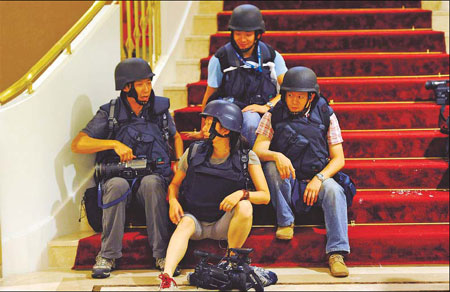Diplomatic and Military Affairs
Opposition, allies implement plan to prevent chaos in Tripoli
Updated: 2011-08-26 08:03
By Joby Warrick and Karen DeYoung (China Daily)
|
(Left to right) Ng Kin Ming from Hong Kong, Feng Yunxian from Beijing, Tang Leung Tong and Matthew Sze Ho Wai from Hong Kong, wait to be evacuated by the International Red Cross from the Rixos hotel in Tripoli on Wednesday. Paul Hackett / Reuters |
WASHINGTON - Among the first waves of rebels to storm Tripoli this week was a small team whose members carried smartphones along with their weapons. Under a well-rehearsed plan, they blasted Arabic text messages that would appear on tens of thousands of cell phones throughout the city.
"Don't destroy public buildings," one read. "These are for the future of Libya."
The dissemination of the messages, intended to discourage looting and arson in liberated parts of the city, was among the lead items on a long to-do list that the rebels are just beginning to put into place. Developed and refined during multiple meetings in Washington, Benghazi, Libya, and Doha, Qatar, the list represents an attempt to anticipate every possible hiccup and challenge that could undermine Libya's transitional government in its first weeks - from reprisal killings to power outages to sewage backups.
Anxious to avoid the anarchy that followed the fall of Baghdad in 2003, rebel leaders and their Western backers began planning five months ago for the aftermath of Muammar Gadhafi's defeat, long before it was clear how, or whether, the Libyan leader would fall.
The rebels' post-victory planning now faces the ultimate test as the National Transitional Council (NTC) seeks to assert its authority amid the chaos of a capital that is still claimed by Gadhafi and contested by remnants of his security forces. US officials say the results so far are encouraging. Tripoli's civilian population has remained relatively subdued and acts of wanton destruction have been few. But they acknowledge that much depends on circumstances that are difficult to control or predict.
"We're at a pivotal transition point now," Jeffrey Feltman, the State Department's chief diplomat for the Middle East, said on Wednesday as he shuttled between meetings on Libya in the Qatari capital of Doha. "There are a lot of challenges ahead, and security is only the first of them."
A European diplomat involved in Libya policy discussions was struck by the amount of detailed discussion of "what needs to happen and who needs to do it".
"Quite a lot of planning has been done already," said the official, who insisted on anonymity in describing diplomatic discussions. "Now everyone is looking at activating all the planning."
The planning for post-Gadhafi Libya, described in interviews with US and European officials, began as early as mid-March, before UN approval of the NATO-led military intervention in Libya. Diplomats and security officials began to map out possible outcomes for what was then a one-sided conflict between powerful, well-trained Libyan troops and disorganized bands of anti-government protesters.
At that time, the likely scenarios ranged from an outright Gadhafi victory to a permanently divided Libya, with rebels maintaining control over a few eastern provinces, US officials said. Only weeks later, after NATO fighter planes gave the rebels space to regroup, did the planners begin to think seriously about a future Libya in which the rebels were in charge.
US and British officials independently began outlining separate visions for how the rebel alliance might assert control over a country with tribal and geographical divisions. In late April, as Western emissaries traveled to Benghazi for meetings with the fledgling NTC, it became clear that the opposition movement was already working through the same issues.
The Washington Post

Specials

Biden Visits China
US Vice-President Joe Biden visits China August 17-22.

Star journalist leaves legacy
Li Xing, China Daily's assistant editor-in-chief and veteran columnist, died of a cerebral hemorrhage on Aug 7 in Washington DC, US.

Hot pots
Tea-making treasures catch the fancy of connoisseurs as record prices brew up interest
